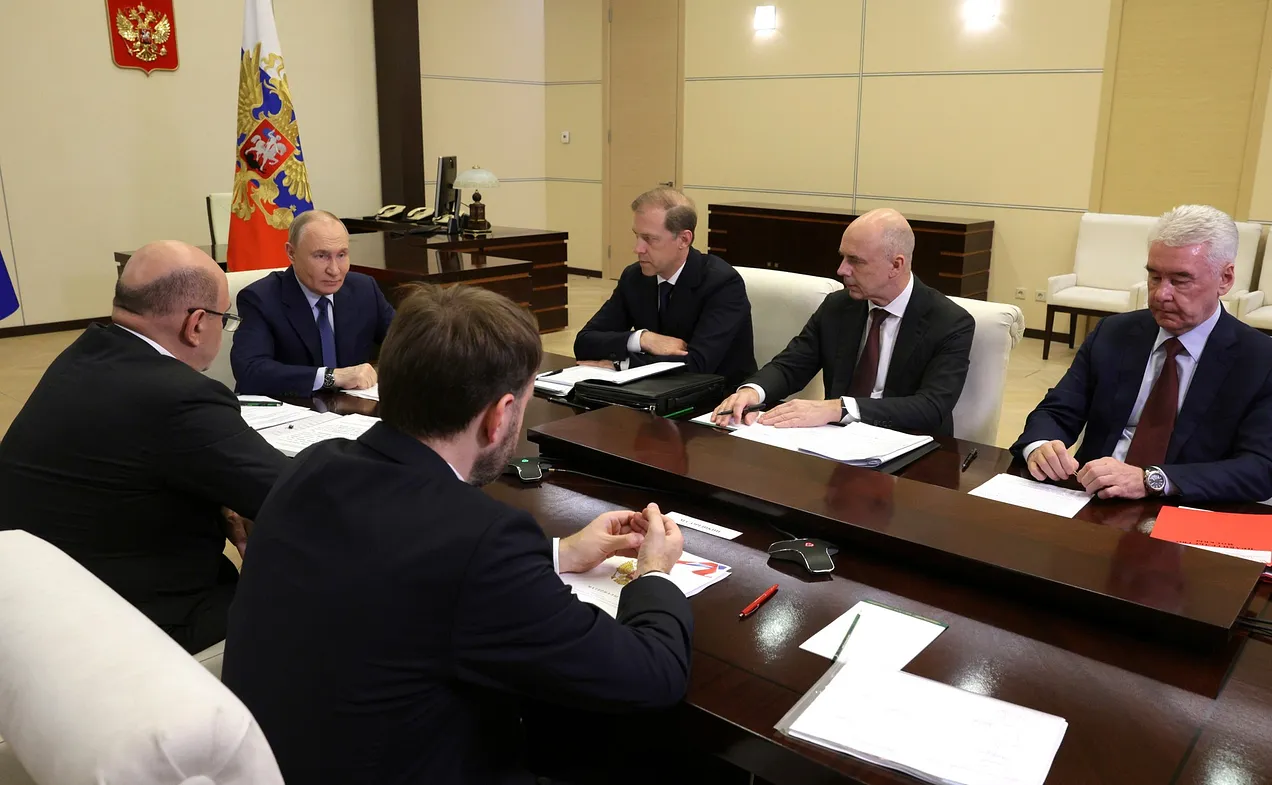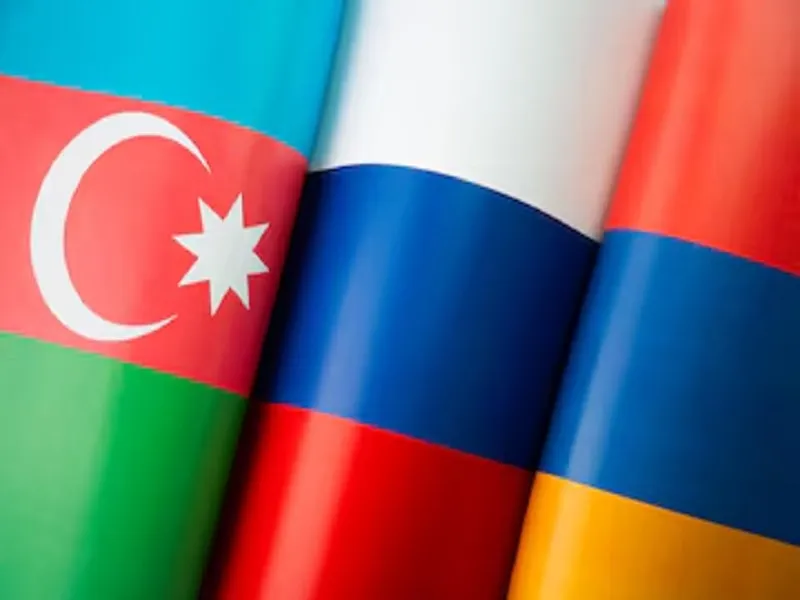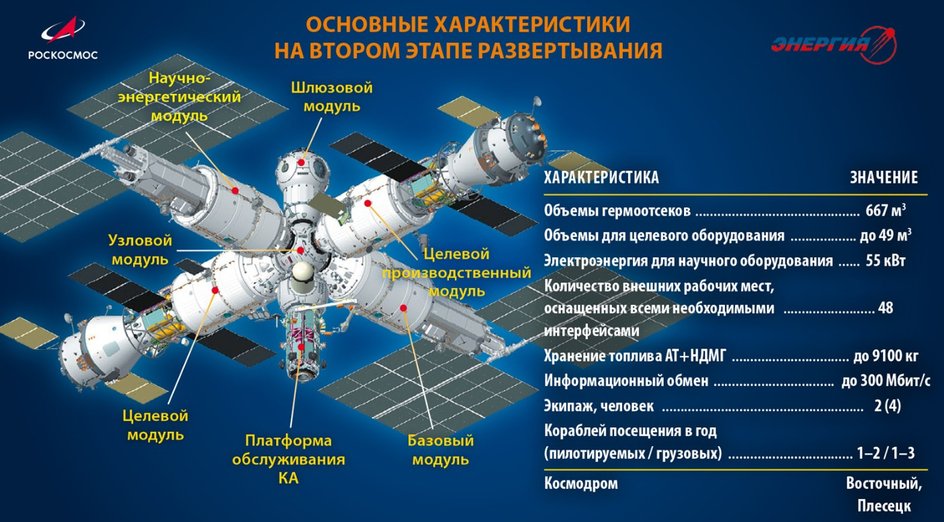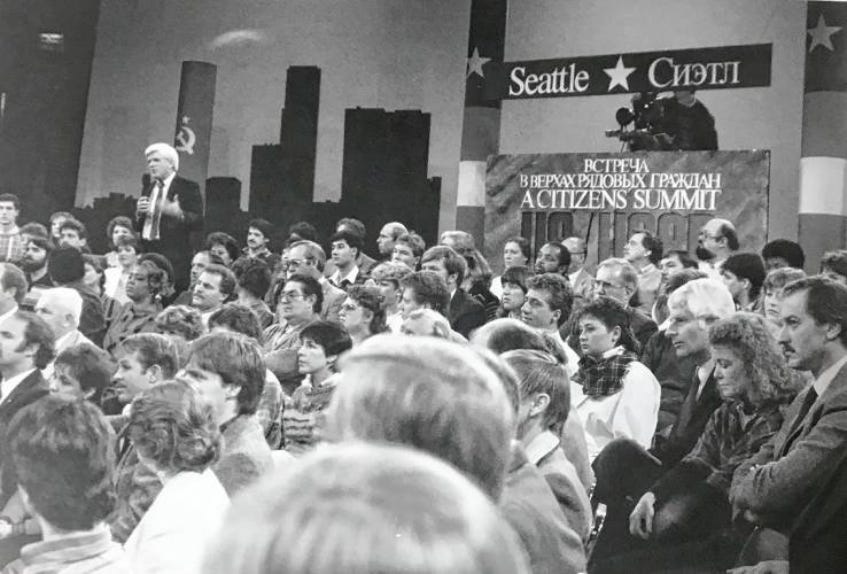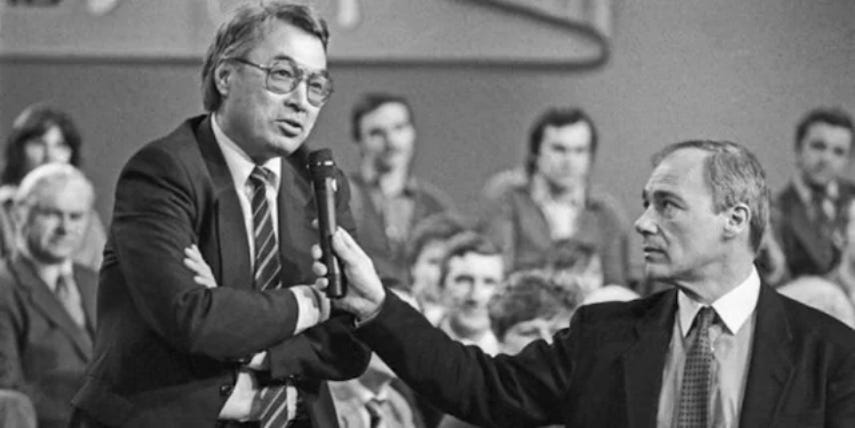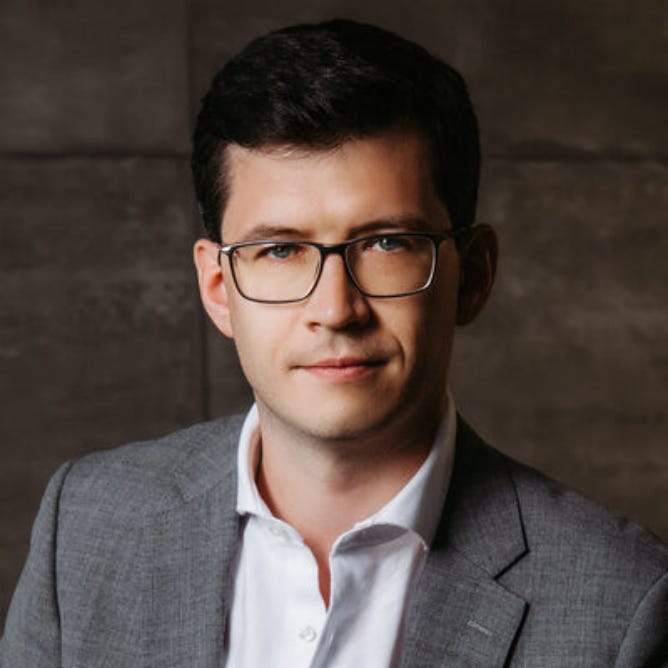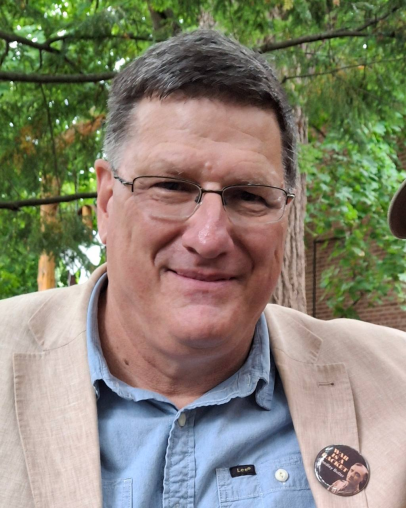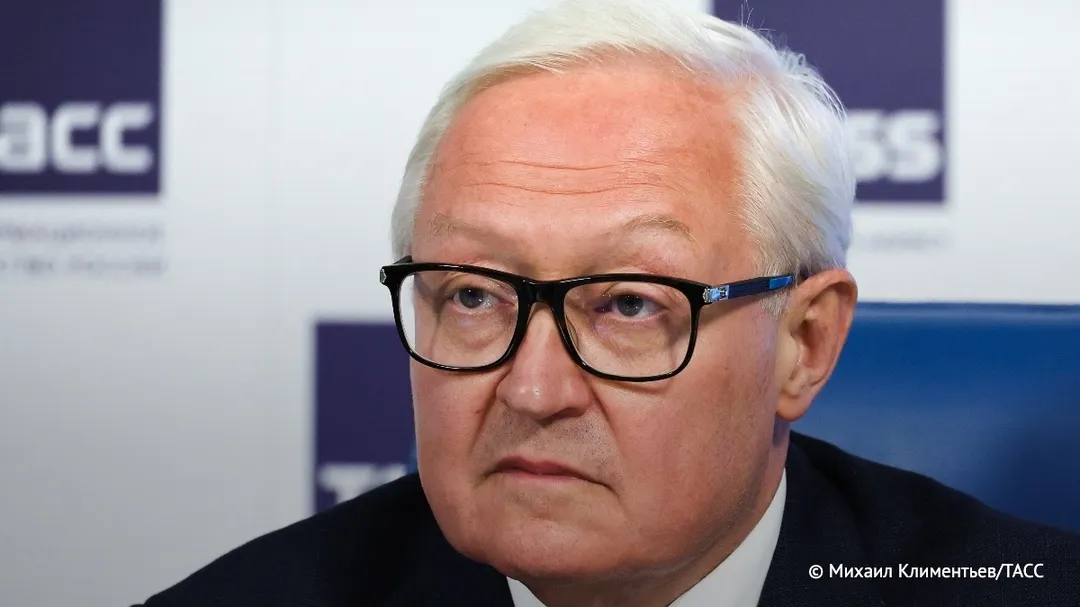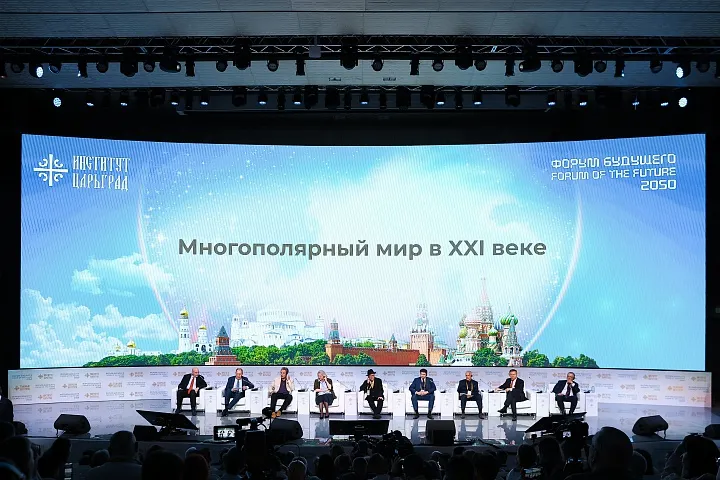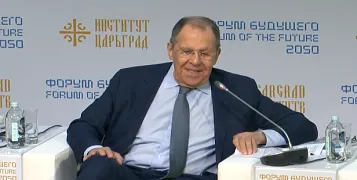An hour-long meeting of the government.
Karl Sanchez
Jun 04, 2025
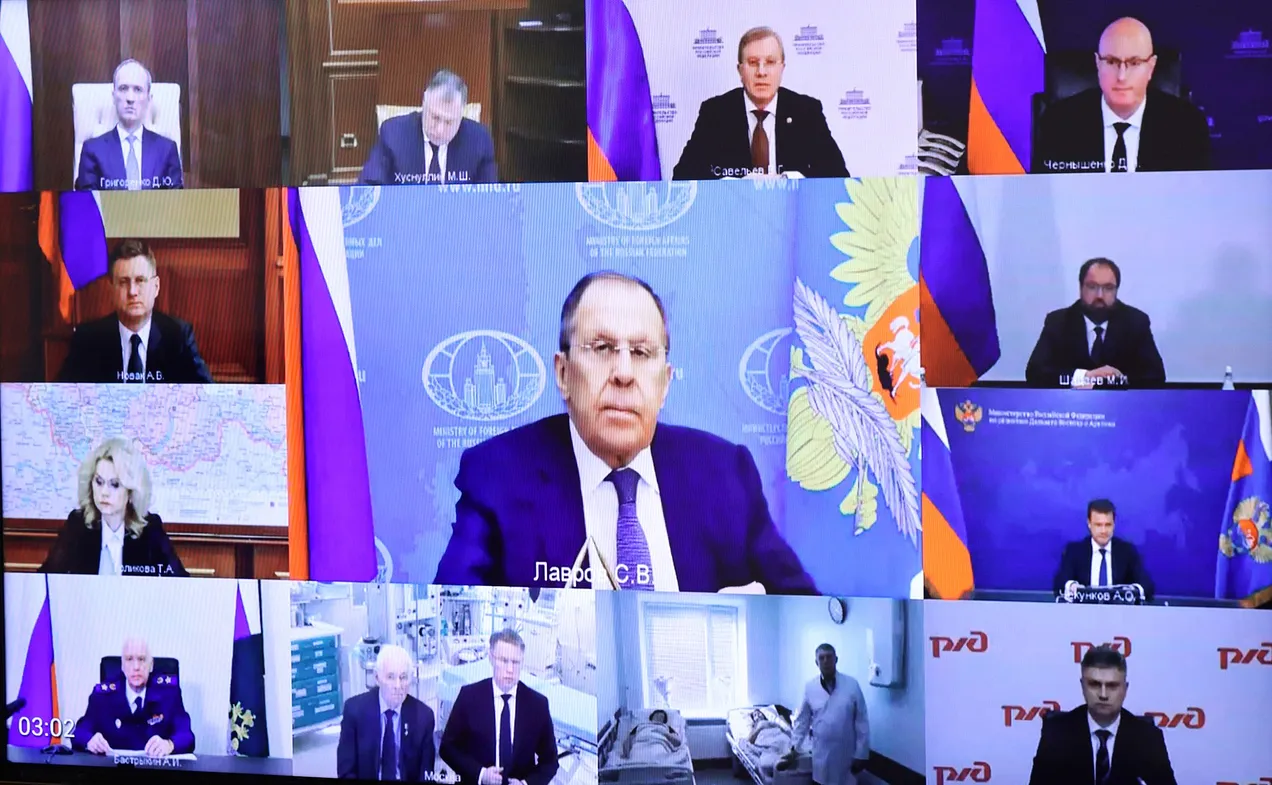
The previously scheduled government meeting was supplemented by the head of the negotiating team Mr. Medinsky’s report, followed by Mr. Lavrov’s assessment. Then reports about the response to the terrorist attacks were provided. These did not include reports on the airfield attacks or their significance. Putin makes his assessment known prior to the meeting turning its attention to its initial agenda a portion of which is provided since it’s clearly of interest to all Russians. Essentially, what’s provided in the transcript is information all Russians need to be informed about. Left unsaid was what Russia’s specific response would be for what ought to be obvious reasons. As you’ll read, Putin’s remarks are very strong, although the dialog will continue. I can’t help comparing Russia’s response to these events with that of the Outlaw US Empire to recent natural disasters and train derailments, specifically the February 2023 East Palestine, Ohio event where new evidence provided by an FOIA lawsuit showed gross Biden administration and other unlawful conduct. Do a search as many damning reports are now available. Now let’s read what was said:
IMO, the locomotive driver, Pavel Mishin, by staying at his post to slow the train and thus sacrificed himself deserves recognition as a Hero of Russia. Putin agreed with Lavrov that the dialog ought to continue but also raised the issue of negotiating with an overt Terror State. Putin also noted that those states assisting the Terror State are thus also Terror States—and that includes the Outlaw US Empire. Putin’s closing assessment merits repeating:Vladimir Putin: Dear colleagues, good afternoon!
We have a regular government meeting, and we will talk about ensuring technological sovereignty in the field of communication services.
But before that, of course, I would like to listen and ask Vladimir Rostislavovich Medinsky to share the results of his trip and negotiations in Istanbul.
Vladimir Rostislavovich, please.
Vladimir Medinsky : Dear Vladimir Vladimirovich, Dear colleagues!
I report that the Istanbul talks were held in a bilateral format, first one-on-one for more than three hours, then with the participation of all members of the delegation. The working language was Russian.
We handed over our draft memorandum on a peaceful settlement, which consisted of two parts. The first part is the conditions for concluding a long-term peace. The second part is the terms of the ceasefire. The Memorandum is based on the basic principles that you formulated at the Foreign Ministry last June. The Ukrainian side promised to study it and give its comments later.
In general, during the negotiations, they confirmed their positions, which are reduced to two points. The first is to start with a 30- or 60-day unconditional cease-fire. The second point is to use this cease-fire to prepare for the summit of heads of state. They set out all this in their version of the memorandum, which was handed over to us on May 28.
"On the sidelines" of the negotiations was the humanitarian issue [the three hours of talks]. We called on them to focus on working out the terms of peace, rather than another temporary truce, and conveyed your position that a meeting at the level of heads of state is possible, but it needs to be thoroughly worked out with results. Since the heads of state should not work out the details of agreements, but approve them, that is, make final decisions on pre-prepared and agreed projects.
As for humanitarian issues, we agreed on the following.
The first is to conduct a parity exchange of prisoners of war numbering at least 1,000 people on each side, primarily in the categories of wounded, seriously ill and prisoners of war under the age of 25. The final parity figures are currently being agreed upon. We assume that it will probably be 1,200 people on each side. And this will again be the biggest exchange of prisoners of war. We are ready to start on June 7, 8, and 9. For our part, we are fully prepared for this.
The second is to create a line of communication to promptly resolve issues of urgent transfer of seriously wounded prisoners of war to each other outside the framework of general exchanges.
Third, we have proposed to transfer more than 6,000 bodies of dead Ukrainian servicemen to Kiev unilaterally. Transfer them to special machines, refrigerated wagons, where they are stored. We are also ready to start doing this in the coming days. We understand that they may also have our bodies–-there are probably many, many fewer of them–-but we have expressed our willingness to accept them if there are any.
Further, we suggested working out the so-called humanitarian pauses in certain areas of the front for two or three days to collect the remains of military personnel, since for security reasons it is impossible to do this without a cease-fire. At first, they supported our proposal, undertook to work on it, but literally two hours later Zelensky publicly renounced the proposed agreement. Nevertheless, we are ready to return to it.
Finally, the Ukrainian side gave us lists of 339 children allegedly abducted from the territory of Ukraine. Here is the list. We looked it over; we have a mechanism for working with the Commissioner for Children's Rights. We'll look into each last name.
But I will note that for propaganda purposes, they previously talked about tens and hundreds of thousands of allegedly removed children. This is actually 339, and we still need to figure out how many of them are there–-they were rescued by our soldiers, taken out from under fire—how many are in our possession, and how many, as practice shows, are then found somewhere in Europe.
So, Mr Putin, an effective channel of cooperation has been established for all humanitarian actions. For other matters, the ball is on their side.
I finished my report. Thank you.
Vladimir Putin: Thank you.
Sergey Viktorovich, how do you assess the results of these negotiations?
Sergey : Thank you, Vladimir Vladimirovich.
Dear colleagues!
Vladimir Rostislavovich spoke about the main results. I think this is important and useful. The process of direct negotiations, which you previously agreed on in one of your last phone conversations with Donald Trump, is working.
Both rounds, as we know, have produced concrete results, including the exchange of prisoners of war a thousand for a thousand. And now, as the head of our delegation Vladimir Rostislavovich Medinsky said, there are additional agreements on a new, no less large-scale exchange, and not just an exchange of prisoners of war in equal proportions, but also the transfer of seriously wounded, sick people, plus the return of the bodies of the dead.
I believe that under all circumstances, it is always better to have a communication channel. This allows us to solve primarily humanitarian issues. And it is probably necessary at this stage to coordinate counter-humanitarian steps as gestures of goodwill, as confidence-building measures. Moreover, as I have already said, there is real progress here.
Due to what has just been said about the proposal for a short two-or three-day pause, in order to collect the bodies of the dead in a decent way on certain sections of the line of contact, it is possible that there are still wounded there: I believe that this is just a gross mistake of the regime in Kiev. I am referring to Zelensky's categorical and crude rejection of this proposal. Just as our initiatives on similar humanitarian pauses on the occasion of Easter and the 80th anniversary of the Great Victory were ignored.
Despite all this, Mr Putin, and despite new major criminal provocations in the last few days, I would consider it important not to succumb to these provocative actions, which are clearly aimed at disrupting negotiations and continuing to receive weapons from European countries.
I believe that all means, including negotiations, should be used to achieve the just goals of the special military operation, and the Ministry of Foreign Affairs is actively participating in the delegation of Vladimir Rostislavovich Medinsky.
Vladimir Putin: I agree with that. There were, in my opinion, as I was informed, some other comments from the Ukrainian side about the composition and level of our delegation.
Sergey Lavrov: Mr President, yes, the comments were anonymous, and they were dispersed by the mass media. No one approached us with specific questions or ideas. Journalists were interested–-we explained what the level of assistant to the President of the Russian Federation means.
Vladimir Putin: Vladimir Rostislavovich, was there something wrong?
Vladimir Medinsky: No, Mr President, I have said everything.
Thank you.
Vladimir Putin: All right, all right. Thank you very much.
I invited Alexander Ivanovich Bastrykin to our meeting [Chairman of the Investigative Committee of the Russian Federation]. I would like to ask him to report on the results of the investigation into the explosions on the railway in the Bryansk and Kursk regions.
Alexander Ivanovich, please.
A. : Dear Vladimir Vladimirovich,
On June 1, 2025, the Investigative Committee initiated and is investigating three criminal cases on three terrorist attacks in the Bryansk and Kursk regions at railway infrastructure facilities.
As a result of these terrorist attacks, passenger and freight trains crashed, civilians and railway transport workers were killed and injured in various degrees of severity.
The first terrorist attack occurred at 22: 33 on May 31, 2025 on the 43rd kilometer of the Pilshino – Vygonichi stage of the Bryansk region of the Moscow Railway. Three explosive devices were detonated, which destroyed the supports of the automobile overpass installed above the railway tracks.
A locomotive of the Klimovo – Moscow passenger train, which was carrying 388 passengers, collided with the fallen fragments of the spans. The locomotive and the first two cars derailed.
As a result of the terrorist attack, 122 people were injured, seven of them were killed–-the driver and six passengers. 66 people were injured, including four young children.
Three explosive devices were laid and their elements were removed. Experts found that the explosive devices were equipped with a plastic explosive of foreign production, their capacity was about 15 kilograms in TNT equivalent. And, what is very important, it was established that the Ukrainian-made LORA control unit was used in the explosion.
The second terrorist attack occurred on the night of June 1, 2025. A railway bridge was blown up at the intersection of the 43rd kilometer of the Trosna-Kalinovka highway in the Kursk region.
The destruction of railway tracks led to the derailment and collapse of the composition of empty freight cars transported on the route Bryansk-Ostapovo-Mikhailovsky Mine. The locomotive caught fire, the train driver and two of his assistants received injuries of varying severity.
An inspection of the scene revealed that five improvised explosive devices were simultaneously detonated on the railway track and under the supports of the railway bridge. According to experts, the devices were equipped with a foreign-made plastic explosive.
The explosives experts participating in the inspection found that the method of activating the explosive device was the LORA control units—again the same LORA—of Ukrainian production, installed on railway tracks.
The third terrorist attack occurred on the morning of June 1, 2025 in the Bryansk region. Five explosive devices installed under the railway track on the 6th kilometer of the Unecha-Zhecha stage were detonated while the locomotive of the Russian Railways diagnostic complex was traveling.
Explosive devices were detonated directly under the locomotive. The railway track and locomotive were damaged. With the participation of experts, two unexploded explosive devices were also found at the crime scene. The mass of the seized plastic explosive of foreign production is not less than two kilograms.
The total amount of damage caused as a result of terrorist attacks, according to preliminary estimates, is more than one billion rubles. The investigation of terrorist attacks is conducted in close cooperation with the FSB and the Ministry of Internal Affairs of Russia.
I would like to report that law enforcement agencies–-the FSB, Rosgvardiya, the Ministry of Internal Affairs and the Ministry of Defense of the Russian Federation–-conducted joint operational measures to detect and neutralize a Ukrainian sabotage and reconnaissance group in the Bryansk Region from May 20 to 25, 2025.
During these events, on May 22, 2025, a cache containing 13 kilograms of plasticite and Ukrainian-made ENT control units, which are used by the special services of Ukraine, was discovered near the village of Myakishevo.
At the scene of all three terrorist attacks, the same professional method of installing explosive devices was used, as well as foreign-made plastic explosives and Ukrainian-made ENT control units. The same blocks were found in the cache.
Thus, the evidence collected by the investigation with the help of experts directly indicates that all three terrorist attacks were, beyond any doubt, organized by the special services of Ukraine. The investigation continues to identify all the perpetrators and organizers of the terrorist attack.
I finished my report.
Vladimir Putin: Thank you.
I ask Mikhail Murashko [Minister of Health] to report on how assistance is being provided to the victims.
Mikhail Murashko : Dear Vladimir Vladimirovich, Dear colleagues,
I will start from the moment the first information arrives at the ambulance control panel. It arrived at 22:48, and in 15 minutes the first two nearest crews arrived at the scene. Then, at 23:15, we increased the number of teams – even from Bryansk additionally – to 17, including the disaster medicine centers and the Russian Railways-medicine team.
The prescribed algorithms of actions and those that we worked out in practical classes clearly worked. The Bryansk Center for Disaster Medicine took over the coordination, including the Federal Center for Disaster Medicine. As the head of the All-Russian Disaster Medicine Service, I was informed at 23: 07.
Immediately after receiving the information, all coordination of forces was organized, also with the participation of the regional health system and the means of Russian Railways.
Employees of the Bryansk region worked well together. Vygonichskaya Central District Hospital, Bryansk city and regional hospitals, as well as the regional Children's Hospital were prepared for the wounded and injured as soon as possible. More than 100 medical workers who were at home after working hours, on their own initiative and on the mobilization reserve, despite non-working hours, arrived at their workplaces.
In the dark, doctors and rescuers pulled victims out of the wreckage and acted in a coordinated manner. And in addition, we deployed ambulance teams in temporary waiting points, which provided necessary assistance–-both psychological and medical, including those in need when sorting out rubble.
I would like to express my deep gratitude to the regional authorities and my colleagues for their high professionalism and dedication in providing medical care. I would also like to thank the train crew guides for providing first aid to the injured.
We have sent 17 specialists from federal institutions and the Moscow Department of Health Care to medical organizations in the Bryansk region for strengthening. Telemedicine consultations were held for all serious patients, and for three children–-with specialists of the Research Institute of Emergency Pediatric Surgery, where I am currently located, and specialists of the RDKB, as well as the N. N. Priorov National Medical Research Center of Traumatology and Orthopedics.
Only six victims, including three children, were evacuated to federal clinics and medical organizations in Moscow. A four-month-old baby in serious condition with multiple injuries was delivered by an air ambulance helicopter: first by ambulance, then a helicopter evacuation was connected.
Now the baby's condition is stabilized. His seven-year-old brother was also brought here. I checked on them today, they are all in stable condition, surrounded by the love and care of doctors and staff, and they feel much better.
At the Kievsky railway station in the city of Moscow, the arrival of passengers was organized, medical assistance and psychological assistance were also deployed.
Currently, 35 people, including three children, are undergoing inpatient treatment, and 11 people are already preparing for discharge. There are no serious patients now. Outpatient care was provided to 29 people, including one child. 29 people were discharged, 56 people received outpatient care.
The total number of patients—including those who applied already and in a later period—we provided assistance to 127 people, including relatives, provided psychological assistance. Medical organizations that provide assistance to victims are fully provided with medicines, medical devices, and blood.
I keep the situation under my personal control.
Completed the report.
Vladimir Putin: Good. Thank you very much.
Next to you is a well-known children's doctor. Do you have anything to add, Leonid Mikhailovich [President of the Research Institute of Emergency Pediatric Surgery and Traumatology]?
Leonid Roshal: Good afternoon, Vladimir Vladimirovich and everyone present!
First of all, I would like to thank you for the opportunity to participate in such a discussion of high-level state issues for the first time. I'm an old man now, and I remember everything very well. I want to go back to 2014.
This year, a child, a boy, with injuries to both legs, amputated hands and a problem with his eyes, was brought to the clinic from the Donbass--a very heavily injured child. And we have asked the leaders of many participating countries to come to Moscow, sit down with this child in 2014, and decide how to end this war.
But, unfortunately, only one person has arrived, Vladimir Vladimirovich, and that is you. You saw this child, which is how it all started--not when the special operation began, but many years before. That is, we didn't start it, and we should remember and know about it.
The same applies, I'm sorry, to Crimea. If what has now been done had not been done, Russia would have been cut off from the Black Sea altogether. It was a forced measure, a historically justified measure.
Unfortunately, the time has come for us to be prepared for all situations. It is possible that such terrorist attacks may continue. We must be united in our desire to achieve peace and victory.
I would like to thank you–-I saw Alexander Ivanovich Bastrykin here--when this child was brought for amputation of limbs, it was his service and he personally who played a big role in ensuring that the child recovered. Thank you very much.
In general, many people lend a helping hand. I was in the thick of things in Bryansk during this tragedy, I understood what was happening. I contacted Bryansk, and I have to tell you: the doctors worked perfectly in Bryansk, just fine.
Some of the children were in the regional adult hospital–-there is a children's neurosurgery, and some of the children were in the regional children's hospital. They did not allow the children's condition to deteriorate and did everything possible to ensure that everything was normal.
Such an opportunity is rarely presented, but I would like to say, Mr Putin. In my lifetime, quite a lot of health ministers have passed, and the share that went to the real Minister of Health is not to be envied. This infection is terrible, which the whole country had to deal with, and now what is happening with military operations… And it works fine, well done. [I interpret this odd paragraph as praise for the current Health Minister who began his tenure as Covid arrived on the scene.]
I thank you for your attention.
Vladimir Putin: Thank you very much.
About the boy who was remembered, I also remember well. I think his name is Vanya. This is such a good example, really.
You have just mentioned what is being done at the regional level for victims. I would like to ask Alexander Bogomaz [Bryansk Governor] to say a few words on this subject.
A. : Hello, dear Vladimir Vladimirovich!
I am in the Bryansk Regional Hospital. Passengers of the Klimov–Moscow train who suffered as a result of the terrorist attack of the armed forces of Ukraine are being treated here.
Behind me is Yulia Nikolaevna, a cardiologist herself, a resident of Nizhny Novgorod. Here Tatyana Ivanovna is a resident of our Bryansk region, works in a hospital, her son is on his own, his condition is satisfactory.
In total, as they said, 127 people applied for medical help. Unfortunately, seven people were killed. On June 2, a three-day mourning period was declared in Bryansk.
Since the notification of the terrorist attack in Bryansk was received, an operational headquarters was formed, which included all the necessary services. On the basis of the Ministry of Emergency Situations and the Department of Social Protection, two "hotlines" were opened, where everyone could find out about their relatives. The work of the ambulance service, as mentioned above, was collective, joint: these are ambulance crews, hospital doctors, employees of Russian Railways, the Ministry of Emergency Situations, rescuers, and passengers of this train themselves.
All evacuation measures were completed within an hour and a half. All the wounded were taken to hospitals in the city of Bryansk. Two temporary accommodation centers were set up for passengers, where doctors and psychologists also worked with them. All those who expressed a desire to continue their journey to Moscow were taken by buses to the railway station and sent to Moscow at five o'clock.
After completing all the evacuation measures, we immediately started clearing the rubble and repairing the railway tracks. Our Bryansk builders, the Ministry of Emergency Situations, railway workers and the Moscow–Bobruisk road Administration also worked here. All activities were completed in less than a day, and traffic was opened at 21: 30 on June 1.
In the Bryansk region, at the very beginning of the special military operation, support measures were taken for our civilians who are being attacked, lose their lives and are injured. We pay one and a half million rubles to families who have lost a loved one, 600 thousand rubles to those who have been seriously injured, and 300 thousand rubles to those who are light and medium. All victims of the terrorist attack will receive these payments.
Dear Vladimir Vladimirovich, I can say that from the first minutes to today I have been keeping the situation under my personal control.
I finished my report.
Vladimir Putin: Good. Thank you, Alexander Vasilyevich.
I would like to wish a speedy recovery to all the victims, including those who are in the ward where you are now. All the best!
Oleg Valentinovich Belozerov [CEO and Chairman of the Management Board, Russian Railways], how is the reconstruction work going and what about payments to the victims and families of the victims? Because in accordance with Russian law, this is on the shoulders of Russian Railways.
You are welcome.
Belozerov: Dear Vladimir Vladimirovich, Dear colleagues!
On May 31, a passenger train collided on the Pilshino–Vygonichi stretch in the Bryansk region, which was already reported. As a result, 30 meters of railway track, a diesel locomotive and three passenger cars were damaged in the railway part to the point of write-off. In the road section, two spans and one intermediate support of the overpass are completely destroyed and cannot be repaired.
In the aftermath of the disaster, recovery headquarters were immediately set up. 180 people were involved in this incident and eleven units of heavy equipment were involved. The total traffic break was about 24 hours.
The incident affected the movement of three passenger trains. The route of two trains was changed, but the trains arrived at their destination on schedule. One train's route was shortened, and passengers were delivered from Bryansk station to their destinations by buses provided by the administration of the Bryansk Region.
Currently, train traffic on the section is carried out without restrictions. At the same time, Rosavtodor organized work on the restoration of the overpass, which will be completed no later than October 1, 2025. Rosavtodor, in coordination with the administration of the Bryansk region, determined temporary detour routes.
According to the second incident on the Ostapovo–Mikhailovsky Mine stretch in the Kursk region, 200 people participated in the elimination of consequences. In connection with this incident, the train traffic pattern was changed, and the roadbed was cleaned of destroyed structures. Currently, car traffic is carried out without restrictions.
The restoration of the railway overpass to its previous dimensions–-we have agreed on this issue with the governor of the Kursk region. There is a nuance: it is necessary to maintain the size for trucks. The work will be completed within two months, and traffic will be opened no later than August 2. During the break of traffic in this direction, the export of goods will be provided using alternative routes and will not affect the volume of traffic.
For the third case in the Bryansk region, there were no serious consequences. All necessary repairs have been completed and traffic is fully restored.
Our main focus, of course, as you said, Mr President, was on the incident involving a passenger train in the Bryansk region and on providing assistance to passengers. Both passengers and employees of Russian Railways were injured. Currently, some of the victims continue inpatient treatment, some have already been discharged.
The company has organized operational interaction with all affected passengers and their relatives. For them, free travel to the Bryansk station is provided.
Taking into account the difficult emotional and physical condition of the passengers, we immediately organized a business trip of our employees to Bryansk to visit all the victims who were placed in hospitals. Assistance was provided with food sets, sanitary and hygienic accessories and the necessary telephone connection was provided.
It was decided to pay 2 million 200 thousand rubles from the charity funds of Russian Railways to the family members of the victims, one million rubles to hospitalized injured passengers with severe severity, 500 thousand rubles to hospitalized injured passengers with moderate and light severity, 100 thousand rubles to passengers who applied for medical assistance. At the moment, 55 payments have already been made in the amount of 36.5 million rubles, including five payments to relatives of the deceased passengers.
All passengers who were on the train at the time of the accident will be refunded the full fare. 354 passengers have already received it, and the remaining passengers will be refunded in the near future, taking into account the specifics of ticket purchase.
In addition, additional payments are provided under the contract on mandatory insurance of the carrier's liability to passengers. We have organized the interaction of affected passengers with the insurance company. A round-the-clock "hotline" for train passengers and their relatives has also been created and operates.
Employees of Russian Railways were also injured in two incidents. The train crew of the passenger train, despite the injuries received, from the first minutes of the incident, together with EMERCOM employees, participated in the evacuation of passengers, including from the destroyed and damaged cars. All our employees are also provided with all the necessary assistance.
Special attention is paid to the family of the deceased train driver Mishin Pavel Nikolaevich.
I would like to express my deepest gratitude to the specialists of the Ministry of Emergency Situations, the Ministry of Health, the administration of the Bryansk and Kursk regions, the Ministry of Defense and the Ministry of Transport for their help. Even Belarusian railway workers came to our aid.
Dear Vladimir Vladimirovich, I ask you to consider encouraging those directly involved in the elimination of the consequences of these accidents, and also to note the actions of the locomotive crew of the passenger train. The train driver remained on the job until the end, showing personal courage. This made it possible to avoid more tragic consequences.
Thanks for attention.
Vladimir Putin: Thank you. thank you.
Tatyana Alekseevna [Deputy Prime Minister], do you have anything to add to what Oleg Valentinovich said?
Tatyana Golikova: Dear Vladimir Vladimirovich, Dear colleagues!
The government, in accordance with the current procedure, will also provide assistance to family members of the deceased citizens in the amount of 1 million 167.5 thousand; citizens who received severe injuries and moderate health injuries in the amount of 627 thousand; light injuries, 313.5 thousand rubles. The relevant Government act will be signed in the near future.
At the same time, I would like to report that at the moment we have awarded survivor's pensions for five children in respect of two dead citizens. Pensions are assigned proactively, without requesting relevant applications. Payments will be made as soon as possible after receiving information about the bank account details for transferring pensions or information on payment through postal organizations.
We have opened "hotlines" for prompt provision of social support measures to victims. We also organized work on the assignment of payments for compulsory social insurance against accidents at work.
24 persons insured under the compulsory social insurance against accidents suffered in the performance of their work duties. As already mentioned, one person was killed, 23 were injured.
Currently, accident investigation commissions have been formed in the Bryansk and Kursk regions. As soon as we receive the appropriate medical reports on the severity of injuries and health, we will assign one-time and monthly insurance payments. The work is under constant control.
Thank you.
Vladimir Putin: Thank you very much.
I would like to say a few words about the first part of our meeting today, and then we will move on to the second part.
First of all, I ask the Government and regional authorities to take all necessary measures to help the families of the victims. And I would like to express my sincere condolences to these families. It is necessary to provide assistance to the victims, all the necessary assistance.
I would like to thank the employees of the Ministry of Emergency Situations, employees of Russian Railways, and other services for everything that you did, dear friends, helping people who got into this most serious accident.
The recent bombing of railway tracks in the Bryansk and Kursk regions is certainly a terrorist act. And decisions to commit such crimes, of course, were made in Ukraine at the political level.
What would you like to mention in this regard? Of course, everywhere and always in the course of armed conflicts, to our great regret, civilians suffer. But what happened in Bryansk, in the Bryansk region, is a targeted attack on civilians, and according to all international norms, such actions are called terrorism.
All the crimes that were committed against civilians, including women and children, on the eve of the next round of the proposed peace talks in Istanbul, were clearly aimed at disrupting the negotiation process. The strike was aimed at the civilian population intentionally.
This only confirms our fears that the already illegitimate regime in Kiev, which once seized power, is gradually being transformed into a terrorist organization, and its sponsors are becoming accomplices of terrorists.
Just recently, the Ukrainian authorities and their allies dreamed of a strategic defeat for Russia on the battlefield. Today, against the backdrop of huge losses, retreating along the entire line of contact, trying to intimidate Russia, the Kiev elite has moved to organize terrorist acts. At the same time, they ask to suspend military operations for 30 or even 60 days and ask for a high-level meeting.
But how can such meetings be held in these conditions? What should I talk about? Who even negotiates with those who rely on terror, with terrorists? And why encourage them by providing a respite in the fighting, which will be used to pump the regime with Western weapons, to continue the violent mobilization and preparation of other terrorist acts, such as those carried out in the Bryansk and Kursk regions?
As for the issues raised by Sergey Viktorovich [Lavrov]—we spoke with him separately on this issue–-regarding the level of our negotiators, the humanitarian pause, in accordance with generally recognized international practice, this level is determined by the country that certain individuals represent. This level can only be evaluated from the outside by those people, those experts who themselves have absolute authority and a high level of competence.
What authority can the leaders of a thoroughly rotten and completely corrupt regime have? This is being talked about all over the world. What competence can be proud of those who caused the armed forces of Ukraine, for example, to suffer absolutely senseless, huge losses in the Kursk region and today suffer one defeat after another on the battlefield?
Apparently, we are dealing with people who not only do not have any significant competence in anything, but also have an elementary political culture, if they allow themselves to make certain statements and even direct insults to those with whom they are trying to agree on something.
As for the next refusal of the truce for two or three days for humanitarian reasons, this is not the first time. This does not surprise us, but only convinces us that the current Kiev regime does not need peace at all. Peace for him, most likely, means the loss of power. And power for this regime, apparently, is more important than peace and the lives of people whom they apparently do not consider their own.
We will also discuss all the nuances of this case with some of our colleagues. We will talk to the Foreign Minister and representatives of the security forces at the next meeting of the Security Council.
Now, a few current questions on today's topic. What would I like to say two words about? The first is about the northern delivery, and this is what I would like to ask. We need to make timely decisions related to the financing of this northern delivery. I won't go into details right now, we do this every year, and I would ask you to pay special attention to it. We'll come back to this in the near future. For now, I'll just confine myself to the topic I've just pointed out.
And the second question. I asked Alexander Novak to report on the second Caucasus Investment Forum. But taking into account the fact that I have scheduled protocol events, I will just draw your attention to the fact that contracts were signed for 206 billion rubles, which is almost twice as much as in 2024. Then I'll ask Alexander Valentinovich to tell me more about this, too.
Let's move on to the main question. Maksut Shadaev on ensuring technological sovereignty in the field of communication services [Minister of Digital Development, Communications and Mass Media of the Russian Federation].
Maksut Igorevich, please.
Shadaev: Good afternoon, dear Vladimir Vladimirovich!
We have repeatedly discussed that Russia is one of the few countries in the world that has a well-developed ecosystem of its own Internet services, and services that are very popular and popular among our population. Here are some figures. Almost 70 percent of Russian users search for information in Yandex, our Russian search engine. In absolute terms, this is almost 50 million people a day, and 40 percent of Russian users use our domestic browser to access Internet sites. In Russian social networks, in VK and Odnoklassniki, we have about 80 percent of the adult population of our country registered. Approximately 60 million people visit them every day.
40 million families regularly make purchases in Russian marketplaces, and 10 million people order a taxi or food delivery every day in Russian mobile applications.
We have a very well-developed online cinema industry. 80 percent of our citizens watch online movies and TV shows on Russian services. That's about 15 million people a day. At the same time, the audience of those who watch Russian films and TV shows has grown significantly in recent years. All this was made possible by measures to support the IT industry and a mechanism to ensure equal competition with global players. At the same time, starting in 2022, we have faced numerous restrictions imposed on our country by foreign digital platforms, global "Big Technologies", as we say. Many of them, in general, did not strive to comply with all the requirements of Russian legislation before, but after the start of the free trade zone, they began, frankly speaking, to behave quite destructively towards Russian users. I'll give you a few examples.
Foreign app stores have started massively blocking the mobile apps of our largest banks, aggregators, and carriers. They are simply removed from the list of apps available for download and our developers are blocked from accessing the stores. In response, with the support of the Government, VK launched a domestic RuStore app store in the summer of 2022, through which you can download blocked mobile apps to Android devices.
Vladimir Vladimirovich, now this app store–-our own, Russian--is installed on more than 80 million devices. 50 million Russian users use it once a month to update their apps. Tens of thousands of mobile apps, including foreign ones, are already available in this store. For example, Chinese manufacturers place games there for access to the Russian audience. In the near future, the State Duma will consider a draft law that, by analogy with the European Union, will oblige manufacturers of mobile devices to provide the ability to install our app store. Next, let's see how it will be executed.
We all remember very well that after the start of the SVO, YouTube, the largest video platform, disabled the ability of our bloggers to earn money from advertising, and last year, without any explanation, this platform began to massively block and delete the channels of our popular authors, including pop stars, whose audience numbered several million subscribers. As a result, these bloggers and authors switched to Russian custom video aggregators. We have two of them: VK Video and Rutube. And we see now that two-thirds of YouTube traffic went to Russian sites: the lion's share went to VK Videos, Rutube also shows a good pace of development. The audience of VK Videos now exceeds 40 million users per day. In general, in this sense, we have well intercepted some of this traffic.
And many other examples. For example, in 2022, the well-known ChatGPT, which was launched, immediately launched with the restriction of access to Russian users, immediately initially blocked the ability of Russian citizens to access their service.
At the same time, it is good that our domestic developers of large language models–-both Yandex and Sber–-launched their competitive applications within a few months, which, in general, are very comparable in quality to ChatGPT. And now the share of these applications within our country in terms of the number of users is 95 percent, which is very important.
I would also like to note that after the start of the Free Trade Zone, Mr Putin, it is a very positive fact that our leading domestic digital platforms have returned to the Russian jurisdiction, so to speak, to their native harbor. Today, of course, the most popular services for our users are foreign instant messengers. They are used daily by more than 90 million people in Russia. Every day, our average user spends about 50 minutes in instant messengers. In general, this is such a significant figure. At the same time, over the past three years, their audience has grown by 30 percent.
At the same time, there are countries that have their own national messengers: Japan, South Korea, Vietnam, China, and now these national messengers dominate local markets.
Recently, VK introduced a fully Russian messenger to the market, which in its basic functionality is comparable to foreign competitors and is not inferior. This application is built on a new architecture, and machine learning technology is immediately integrated into it. And this messenger already, according to numerous reviews, provides a very good quality of voice calls, better than that of foreign messengers.
The most important thing is that it is an open platform that allows external providers to embed their own services inside the messenger. For example, banks can implement their own services for secure interaction with their customers.
Mr President, it is also possible to organize additional provision of state services on this platform. Our citizens, for example, can use the messenger to present digital documents that can replace a paper passport in simple everyday situations. We have discussed this several times. For example, when confirming the status of a school student, a student for free admission to museums, or presenting transport management rights, buying alcohol or tobacco, presenting their age, or checking into a hotel.
I would like to emphasize once again that digital documents do not replace a paper passport in any way and allow those who want and are ready to use the mobile application on their smartphone.
The messenger user can also be given the opportunity to sign digital documents. We have also discussed this several times, and it is very important for us to provide our citizens with an electronic signature.
We currently have the Gosklyuch app running. An electronic signature is available free of charge for all our citizens. Actually, the messenger can be used to sign simple documents between citizens. This is a consent to the processing of personal data or an apartment rental agreement, a car purchase and sale agreement, or, if a person goes to dentistry with us, you need to sign a contract for the provision of medical services. To do this, we can build Gosklyuch services in the messenger.
Vladimir Vladimirovich, our school chats are very popular. During the covid period, we created such a service on the Spherum communication platform, which is provided by VK. There are already 35 million registered users–-students, their parents, and teachers. More than 90 million people use Russian school chats every day. Obviously, now these chats can also go to the Russian messenger. At the same time, we can also implement the ability to directly receive grades or homework assignments from the electronic journal and diary management system. Now they usually take a screenshot and send it to messengers.
I would also like to remind you, Mr Putin, that parents are still forced to write explanatory notes on paper, filling out and giving this paper away when a child skips classes for various reasons. It is clear that this service can also be implemented in the messenger.
And, of course, we discuss a lot that instant messengers are a very convenient channel for receiving public services. We can embed a so-called assistant or, as they say now, a "digital assistant" in it, which will tell the user what requirements they must meet to receive a particular service, submit the necessary documents for them, and, so to speak, provide a digital document confirming the fact of providing the service directly in the messenger.
We are currently working on the technical development of these services. A draft law has been prepared that will create the necessary legal framework for their phased launch. From this point of view, we are ready.
Vladimir Putin: Yes. In this regard, I want to say something, I want to ask Dmitry Grigorenko about something—just pay special attention to supporting the Internet as a whole, because without this, it will be very difficult for us to support our manager. First.
And secondly, I am now addressing the heads of all Government departments—I ask them to keep in mind and purposefully organize work to support the Russian messenger, and for this, the services provided by various departments, financial institutions, and so on need to be transferred to this platform. This is extremely important. [My Emphasis]
However, I disagree with Putin saying the Ukraine regime is only now becoming a terrorist regime when it actually began as a terrorist regime. The West’s optimal choices for its proxy forces have always been a mixture of right-wing extremists and Nazis and the arming and training of Death Squads and Terrorists—choices with a very long historical background that actually pre-dates the Colonial Era by almost 900 years. To be sure, this is a very specific Western behavior that Western imitators like Japan copied.And power for this regime, apparently, is more important than peace and the lives of people whom they apparently do not consider their own.
Putin noted a further discussion will occur within the Security Council on what measures to take in response, not just to Kiev but also to NATO which clearly helped plan the airfield attacks. The motive for the latter IMO is the destruction of the last nuclear weapons agreement—New START—so it won’t be renewed in 2026. IMO, only Neocons would have that motive. IMO, NATO’s fingerprints are covered rather well by its proxy’s. Of course, I don’t and won’t know what Russia will do, but I wouldn’t be surprised to see the buildings housing the Ukrainian intelligence and special services offices completely evaporated by a series of Oreshniks to reach into the depths that exist well below the surface.
The closing report on Russia’s digitalization process shows outstanding progress. Russians IMO are one of the best looked after people on the planet. I only highlighted one response to Putin that monitoring the situation was under personal control of the government official involved. Word has spread that’s what’s expected nowadays.
https://karlof1.substack.com/p/medinsky ... -and-other
